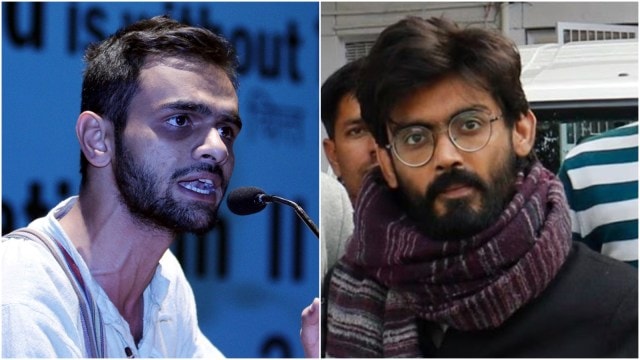Delhi riots case: SC issues notice on bail pleas by accused Umar Khalid, Sharjeel Imam and others; ‘waited 5 years,’ says counsel
The Delhi High Court had recently rejected the bail pleas of nine accused in the case, saying that the riots, which killed 29 people, were a “premeditated, well-orchestrated conspiracy”.
 The bench, however, said, “We will hear you. We will dispose of the petition” at the earliest. (File Photos)
The bench, however, said, “We will hear you. We will dispose of the petition” at the earliest. (File Photos)The Supreme Court Monday issued notice on pleas by 2020 Delhi riots case accused Umar Khalid, Sharjeel Imam, Gulfisha Fatima, Meeran Haider and Shifa Ur-Rehman seeking bail.
A bench of Justices Aravind Kumar and N V Anjaria issued the notice to the Delhi Police on the accused’s pleas challenging the September 2 Delhi High Court order that dismissed their bail applications, and fixed it for hearing next on October 7.
The matter was last listed before a bench of Justices Aravind Kumar and Manmohan on September 19, but it was not taken up. On Monday, Justice Kumar explained that it could not be taken up that day “because my bench partner (Justice Manmohan) was disabled”. As a lawyer, Justice Manmohan had practised in the office of Senior Advocate Kapil Sibal who is one of the lawyers representing the accused in the case.
Appearing for an accused, Senior Advocate A M Singh said that his client, a student, has been behind bars for five years in the case. He urged the court to also consider issuing notice on the prayer for interim bail.
The bench, however, said, “We will hear you. We will dispose of the petition” at the earliest.
Urging the court to hear it at the earliest possible date, Singhvi said, “It’s a liberty matter. We have all waited for five years. The court…has made us wait for five years. I’m really sorry to say that… Shocking that a student has to be behind bars for five years.”
The Delhi High Court had rejected the bail pleas of nine accused in the case, including Khalid, Imam, Fathima, Rehman and Haider, saying that the riots, which killed 29 people and injured hundreds, were not a “regular protest” but a “premeditated, well-orchestrated conspiracy”.
The others who were denied relief are Athar Khan, Abdul Khalid Saifi, Mohammed Saleem Khan, and Shadab Ahmed. “….in the conspectus of the allegations levelled, it emerges that the role of the appellants – Sharjeel Imam and Umar Khalid – is prima facie grave in the entire conspiracy, having delivered inflammatory speeches on communal lines to instigate a mass mobilisation of members of the Muslim community,” the Delhi High Court had said.
Drawing a line on the limits of right to protest vis-a-vis the right to freedom of speech, the high court said, “If the exercise of an unfettered right to protest were permitted, it would damage the constitutional framework and impinge upon the law-and-order situation in the country.”
“Any conspiratorial violence under the garb of protests or demonstrations by the citizens cannot be permitted. Such actions must be regulated and checked by the state machinery, as they do not fall within the ambit of the freedom of speech, expression, and association,” it added.
Three other accused—Natasha Narwal, Devangana Kalita and Asif Iqbal Tanha—were granted bail by the Delhi High Court in June 2021, while a fourth accused and former Congress councillor, Ishrat Jahan, was granted bail in March 2022.






- 01
- 02
- 03
- 04
- 05

























